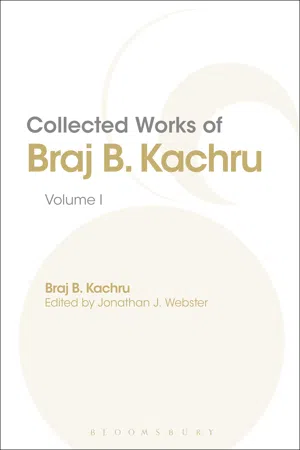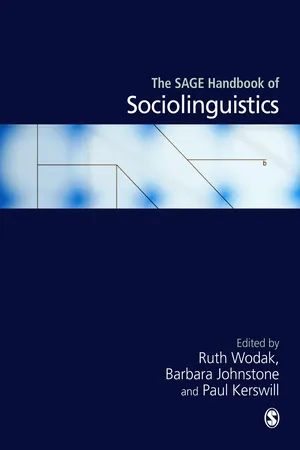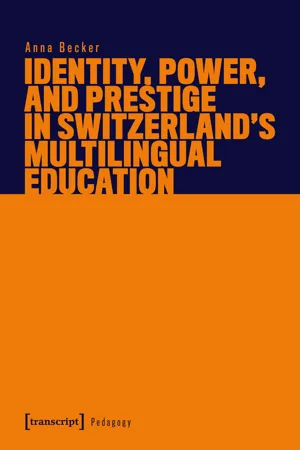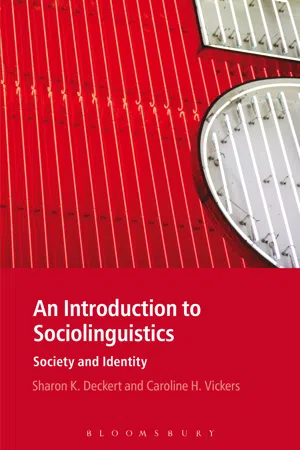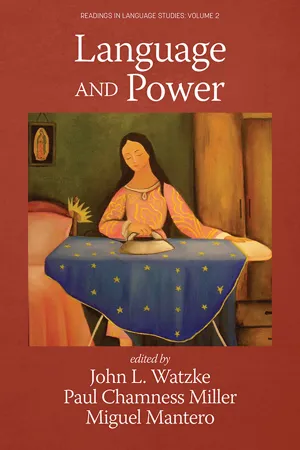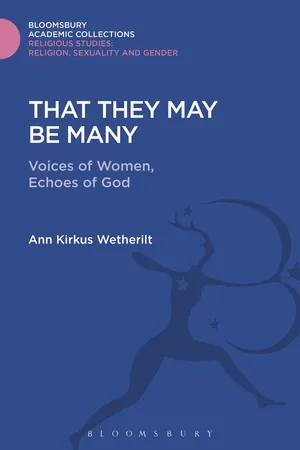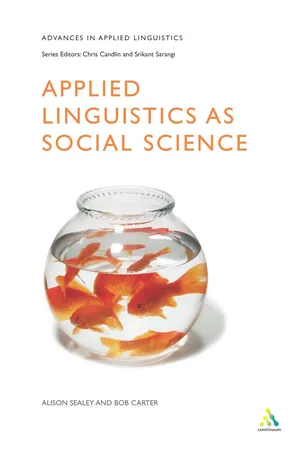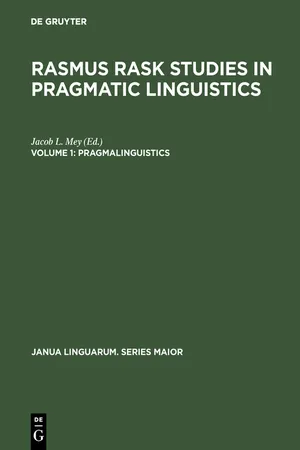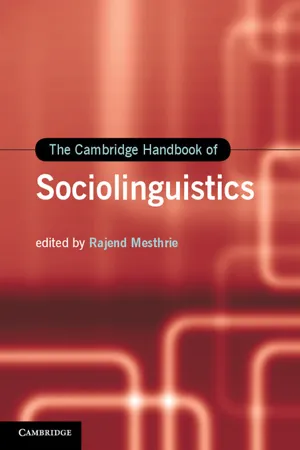Languages & Linguistics
Language and Power
"Language and Power" refers to the relationship between language and the ability to influence or control others. It explores how language can be used to assert authority, shape perceptions, and maintain social hierarchies. This concept encompasses the ways in which language can be a tool for domination, resistance, and negotiation within various social, political, and cultural contexts.
Written by Perlego with AI-assistance
Related key terms
1 of 5
9 Key excerpts on "Language and Power"
- eBook - ePub
- Braj Kachru, Jonathan J. Webster(Authors)
- 2015(Publication Date)
- Bloomsbury Academic(Publisher)
In this study, however, I have a modest aim: to provide a blueprint for the discussion of selected issues related to the power and politics of the spread of English in a global context. While addressing the specific issues concerning English, an aside on the frameworks for the theoretical conceptualization of the relationship between Language and Power—and its politics—will be helpful. This aside will, I hope, contribute to our understanding of the complexity of describing the relationship between Language and Power.I will briefly explore several other interrelated issues connected with Language and Power. These include the concept of “power” and its application for language; the motivation for acquiring linguistic power; presuppositions for a power base; strategies used for power and politics; linguistic power and lingocide; and the politics of language in the Inner Circle of English, comprising the users of English in the United States, Britain, Canada, Australia, and New Zealand2 ; and, finally, will revisit the issue of a framework for the study of power.However, let me start with a warning: questions about Language and Power need not necessarily involve linguistic issues. The issues go beyond linguistics into the realms of history, sociology, attitude studies, politics, and into very mundane economic considerations. Thus this topic has many faces, and the power of English has yet to be studied from all of these perspectives. This chapter, then, reveals only a minute tip of the iceberg.The two crucial terms in this chapter, the “power” and “politics” of English, are linked in more than one way: the first implies an attainment of various types of “control,” and the second signifies the processes and strategies used for this control (see, e.g., Kramarae et al. 1984:9–22).Once a language attains power, it does not mean that political strategies are necessarily abandoned—far from it. Rather it is a vicious circle: in order for power and control to be maintained, political maneuvering must continue, which, then, develops into various situations of conflict (for discussions of case studies of language conflict, see Bourhis 1984; Brass 1974; Das Gupta 1970).How do power and politics relate to language? The power of language is intimately connected with societal power of various types. The dimensions of power and resultant politics include: (a) the spread of a language to numerically expand the speech community3 - eBook - PDF
- Ruth Wodak, Barbara Johnstone, Paul E Kerswill, Ruth Wodak, Barbara Johnstone, Paul E Kerswill(Authors)
- 2010(Publication Date)
- SAGE Publications Ltd(Publisher)
Building heavily on the sociological theories of Bourdieu (1977), Habermas (1981), Foucault (1981) or Lukes (1974), this discipline has, over time, developed a whole range of different approaches that aim to translate abstract theory on the interplay between Language and Power into analytical frameworks for the study of the empirical mani-festation of power in social life. Above all, it is the more critical branches of sociolinguistics that have emphasized the role of power in communica-tion and discourse, and their potential exclusionary effects. Readers of this chapter might be pleased if we formulated a concise definition of power. Alas, power qualifies like few other concepts as an essentially contested concept. There are probably as many power concepts as there are authors writ-ing about power. In general, however, it seems at least possible to distinguish between different understandings of power that relate to differing levels of analysis chosen for the study of social life. On the one hand, power is often seen – in its simplest form – as the capacity of an individual to pursue his or her interest even against the resist-ance of another person (Dahl, 1957; Weber, 1978). Such a behaviouralist notion of power assumes that power is at play where one human being’s interests or will prevail over another’s. Related to discourse, such a perspective would, for example, look at the ways in which people seek to dominate others in language exchange and communication, the ways in which individuals attempt to silence others when talking or writing, the manifold ways in which human beings seek to gain control over discourses and to manipulate others using language, or the argumentative moves that people make to convince others that their opinion is right POWER AND DISCOURSE 141 and the other person’s wrong. On the other hand, power is also seen as a much more diffuse phe-nomenon that is embodied in the social structures in which human interaction is integrated. - Anna Becker(Author)
- 2023(Publication Date)
- transcript Verlag(Publisher)
Education, Languages, and Power 2.1 Introduction This chapter’s focus is to situate this study in the wider field of critical multilingual education research by drawing from educational and applied linguistics literature. Its aim is to elaborate the underlying framework of power mechanisms, as well as explicit and implicit language education policies, in schools in order to analyze and interpret study subjects’ perspectives on and experiences with language hierarchies and ideologies thereafter. First, the relationship between power and education in a broader sense will be discussed, which will serve as the study’s theoretical foun- dation (2.2). Second, the aspect of language will be integrated into the discussion of power relations in order to demonstrate how language can both connect cultur- ally diverse groups and improve mutual understanding, but how it can also cre- ate barriers and engender social exclusion (2.3). The role of English in particular, as mediator or troublemaker, is examined in section 2.4, following a relatively new re- search paradigm of (unequal) Englishes. These power dynamics are further elucidated through the concept of critical multiculturalism (2.5). Plurilingual identities are ana- lyzed with regard to individuals’ linguistic repertoires and the concepts of heteroglos- sia and translanguaging in section 2.6. Finally, ways in which multilingual education can be practiced through different pedagogic approaches, such as translanguaging or content and integrated language learning (CLIL), are presented. 34 Identity, Power, and Prestige in Switzerland’s Multilingual Education 2.2 Education and Power The starting-point of critical elabo- ration is the consciousness of what one really is, and is ‘knowing thy- self’ as a product of the historical process to date which has deposited in you an infinity of traces, without leaving an inventory.- eBook - PDF
An Introduction to Sociolinguistics
Society and Identity
- Sharon K. Deckert, Caroline H. Vickers(Authors)
- 2011(Publication Date)
- Continuum(Publisher)
Language, Power, and Macro-societal Issues 161 In this section, we have considered how conceptions of power in language are intricately related to the positions within a social hierarchy that each language occupies, and have discussed how these hierarchies are related to historical factors, such as government policies and the rise of the mass media. 7.2 Language in the public sphere The public sphere continues to have an influence on the way that people use language, the way that people perceive the languages around them, and the way that people interact through language. Language in the public sphere is language as it is used in situations in which many people have access to that language. In this definition, most language use is public. An example of lan-guage in the public sphere would be a news broadcast of a political speech. Language in the public sphere is not necessarily oral; it can also be written. Published works of fiction and poetry would be language in the public sphere. Blogs, websites, and Facebook posts, to name a few examples, would also be examples of language in the public sphere even though they may reach much narrower audiences. The size of the audience, then, is not what defines the public sphere, rather it is the fact that the language use is shaped for other people to have access to it that defines the public sphere. 7.2.1 Critical perspectives on language in the public sphere Scholars who take a critical perspective on the study of language take overtly political stances to demonstrate how language use indexes societal-level issues. This perspective is often termed Critical Discourse Analysis . This type of analysis can be used to address questions of language and identity or language and ideology. A critical discourse analysis is achieved by looking closely at linguistic features (Fairclough, 1989), such as vocabulary, grammar, and textual structures, and analyzing how these features construct meaning and how that meaning constructs power. - eBook - PDF
- John L Watzke, Paul Chamness Miller, Miguel Mantero, John L Watzke, Paul Chamness Miller, Miguel Mantero(Authors)
- 2022(Publication Date)
- Information Age Publishing(Publisher)
In this section we have seen how power is defined, shaped and challenged linguistically, allowing politicians to set alliances and construct enemies by indexing sociocultural realities and evoking voices into the present time to support their own political goals. Power, Emotions, and Agency in Political Discourse 215 Conclusions This chapter has intended to shed some light into crucial discussions on the relationship between language use in the genre of political discourse and notions of power, agency, emotions, solidarity, and voicing. Many experts would agree on the intrinsic relationship between power and political lan- guage: “Politics, after all, is the art of using power in order to achieve social goals” (Ringmar, 2007, p. 119). This chapter shows, through linguistic analy- ses, explicitly how these notions are displayed and indexed by specific lexical choices. This chapter contributes to a better understanding of how language is used to accomplish political goals. This chapter has attempted to show dif- ferent examples in which politicians can, for instance, build rapport with the audience to look for their support or demonize the enemy to invite the pub- lic to position themselves within the situation presented. It is ultimately the linguistic choices and their use or avoidance that builds the political message and enables a politician to declare enemies or allies, war or peace. Notes I follow Seliger’s definition on 1. ideology: “Sets of ideas by which men posit, ex- plain and justify ends and means of organized social action, and specifically po- litical action irrespective of whether such action aims to preserve, amend, uproot or rebuild a given social order” (Seliger 1976: 14). Throughout this chapter, bolded text is meant to guide the reader to the most 2. - eBook - PDF
That They May be Many
Voices of Women, Echoes of God
- Ann Kirkus Wetherilt(Author)
- 2016(Publication Date)
- Bloomsbury Academic(Publisher)
Both proponents and opponents of empowering the marginalized, then, have recognized the importance of language as an instrument that can be used for liberation or for repression. In the current feminist movement, theorists have discovered the im-portance of language in empowering a community's capacity to live 14 That They May Be Many together in the world. Because language—broadly understood—is that through which all humans conceptualize their multifaceted experiences of living in the world, a brief examination of the insights of feminist theorists of language is in order. Language: Toward More Adequate Definition Language is central to all human experience; and particularly signifi-cant to the present study is its expression in diverse voices. Language both reflects and changes (or represses change in) social reality. Pamela Milne describes language as one of the most distinctive features of our humanity and points out that language shapes us and we use lan-guage to shape our world With it we explore, we create and we influence the lives of others. 1 The centrality of language in defining as well as describing reality has led to a proliferation of texts on the subject by feminist theorists. In 1975, the publication of Robin Lakoff's Language and Woman's Place sparked debates about the existence of a particular style of writing and speaking developed by women in a sexist society. 2 Casey Miller and Kate Swift analyzed the impact of language on women's lives in social terms, focusing on the power of language both to liberate and to maintain current power structures. 3 Dale Spender examined the structure of the English language and con-cluded that the grammar, vocabulary, and syntax were man-made in their fundamental construction. 4 Mary Daly's Beyond God the Father moved the discussion into the specifically theological arena by challeng-ing male language and metaphors not only for persons but also for God. - eBook - PDF
- Alison Sealey, Bob Carter(Authors)
- 2004(Publication Date)
- Continuum(Publisher)
7 Language in the world: properties and powers Introduction The purpose of this chapter is to demonstrate how the concepts elab-orated so far throw light on some areas of policy and practice which are of particular interest to applied linguists. These are presented in order from the most micro, linguistic end to the most macro, social end of a notional continuum, and they include: linguistic autonomy; literacy and the writing system; language and literacy education policy in England; and the struggle over ideas about global and threatened lan-guages. Obviously, each of these topics is very substantial, and we cannot possibly discuss them with the depth of treatment they receive elsewhere, so the chapter will aim to explore how the concepts which are the central concern of the book illuminate debates about these issues in what we hope is a distinctive and constructive way. However human beings have come to have access to language, as a species or as individuals, the products of linguistic activity can be seen as analytically separable from them, and it is this which points to the partial autonomy of language as a cultural emergent property. Before going on to consider evidence for 'autonomy', let us first deal with the qualifier in this label. In this section we shall be demon-strating some of the ways in which language seems to function in its own right, and we find in the descriptions we cite of sound systems, morphology, syntax and corpus semantics some surprisingly similar discursive moves. Presumably because it is language systems which are the theme of these accounts, they sometimes appear to have agency ascribed to them. When this is no more than metaphorical, it is largely unproblematic. - eBook - PDF
Pragmalinguistics
Theory and Practice
- Jacob L. Mey(Author)
- 2017(Publication Date)
- De Gruyter Mouton(Publisher)
Were we to formu-late 'the weakest version' of Whorf's hypothesis, it would be that the linguistic medium, with its implicit structuring, limits that which we can LANGUAGE AS A MEANS OF SOCIAL POWER 147 communicate. 25 It is tempting to underline the fact that even in their critical review of psycholinguistics Miller and McNeill 'forget' to bring the perspective of communication into this discussion. - Against this background it is important to see the user of language as structuring, constructive and creative, in other words, to see language as a tool or instrument of power in this process. 2. The Transmitter's Different Power Tools The following more detailed analysis and exemplification of some of the transmitter's 'instruments of power' will hopefully testify to the relevance of the more theoretical points made above. Furthermore, it is our hope that the following more 'empirical' analysis will demonstrate the need of studying language as embedded in a social context or matrix. The following list of 'power instruments' does not claim to be complete, and it has to be supplemented by further analyses, theoretical as well as empirical. The following six 'power instruments' on behalf of the transmitter will be explored: (1) Choice of words and expressions; (2) creation of (new) words and expressions; (3) choice of grammatical form; (4) choice of sequence; (5) use of suprasegmental features; (6) choice of implicit or tacit premises. 2.1 Choice of words and expressions The reason that choice of word or phrase (expression) represents a tool or instrument of power lies in the fact that one and the same phenom-enon can be expressed in several synonymous ways. There may be one meaning and different referents, or different meanings and one referent, to quote Vygotsky (1963:73). - eBook - PDF
- Rajend Mesthrie(Author)
- 2011(Publication Date)
- Cambridge University Press(Publisher)
Choice and sequence have both been shown to vary systematically. Texts such as those of Wardhaugh ( 1994) illustrate the international variety and intra-language complexity, respectively. In terms of explanations, perhaps the first point to be made is trite, but too often forgotten. Language was devised as a system of communi- cation. For it to function efficiently, its users need to share the meanings and pragmatic conventions of words, utterances, and discourse. The dis- tinctions achieved in forms of address and reference exist only to mark personal and social identities and to regulate the statuses and social rela- tionships among participants and observers. It is hardly surprising, then, that we as people can explain what is going on in particular exchanges. As social psychologists, however, we require more abstract and general levels of interpretation. Brown ( 1965) postulated two underlying dimen- sions, which he labeled as the power and solidariness semantics. The nature and operation of these have needed elaboration, but the basic distinction stands. The power semantic is the simpler one: asymmetry in terms of address and reference implicates differences in power. This asymmetry does not indicate what kind of power is involved, which may vary from expecting subordinates to make coffee to an expectation that they will advance to be shot at by an enemy. Social positions and roles occupied have explicit or implicit rights and obligations associated with them, and a knowledge of the particularities is necessary to define the parameters within which the asymmetry of use of terms is operating. Symmetry in terms used does not mean that there is no power differ- ential, but only that if it exists, it is temporarily in abeyance or that it is being marked in other ways. Hence, the relevant generalizing prop- osition would be that if asymmetry in address or reference terms exist, then this marks a difference in power in respect of some social rights and obligations.
Index pages curate the most relevant extracts from our library of academic textbooks. They’ve been created using an in-house natural language model (NLM), each adding context and meaning to key research topics.
